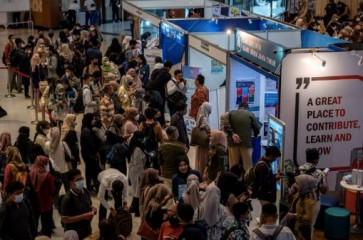Popular Reads
Top Results
Can't find what you're looking for?
View all search resultsPopular Reads
Top Results
Can't find what you're looking for?
View all search resultsThe labor market dynamics and challenges for labor insurance
With more workers losing their jobs, BPJS’ potential revenue from contributions is threatened, and its capability to protect workers will decline.
Change text size
Gift Premium Articles
to Anyone
 Crowds of job seekers throng a job fair on March 7, 2023 in Surabaya, East Java. Data from Statistics Indonesia show that open unemployment in the country was 4.82 percent of the 149.38 million-strong workforce in February 2024, down 0.63 percent compared with the same period last year. (Antara/Juni Kriswanto)
Crowds of job seekers throng a job fair on March 7, 2023 in Surabaya, East Java. Data from Statistics Indonesia show that open unemployment in the country was 4.82 percent of the 149.38 million-strong workforce in February 2024, down 0.63 percent compared with the same period last year. (Antara/Juni Kriswanto)
A
mid the economic uncertainty plaguing Indonesia, the dynamics of the national labor market have given cause for concern to many. The widespread layoffs, particularly in sectors such as manufacturing and services, have added to the burden for many workers already squeezed by the post-pandemic situation.
According to the Manpower Ministry, as of Aug. 26, a total of 45,969 workers have lost their jobs, with the number predicted to increase to 70,000 by the end of the year. In this context, state labor insurance provider BPJS Ketenagakerjaan faces a significant challenge to expand the coverage of social security for all workers, including the growing number of informal workers.
BPJS Ketenagakerjaan recorded a decrease in the number of active participants by 0.23 percent year on year up to September 2024. This decline has the potential to worsen its financial burden and reduce its capacity to provide adequate social protection. If the trend of layoffs continues without intervention from the government or relevant parties, BPJS Ketenagakerjaan will face difficulties in fulfilling its obligations.
Mass layoffs not only impact the lives of individual workers but also the finances of BPJS Ketenagakerjaan. Every time a worker is laid off, contributions that should have been made to the social security system decrease.
With more workers losing their jobs, the BPJS’ potential revenue from contributions is also threatened. This could disrupt BPJS Ketenagakerjaan’s ability to provide benefits to active participants and pay social security claims for those affected by layoffs.
For example, as of September 2024, BPJS Ketenagakerjaan’s total managed funds amounted to Rp 776.80 trillion (US$50.1 billion). However, if the trend of layoffs continues unabated, the potential long-term deficit poses a real threat to the financial sustainability of the social security program.
Another major challenge is the high proportion of informal workers in Indonesia. As of February 2024, the number of informal workers reached 84.13 million people, equivalent to 59.17 percent of the total workforce, many of whom do not have access to social security such as health, occupational accidents or pension benefits.


















